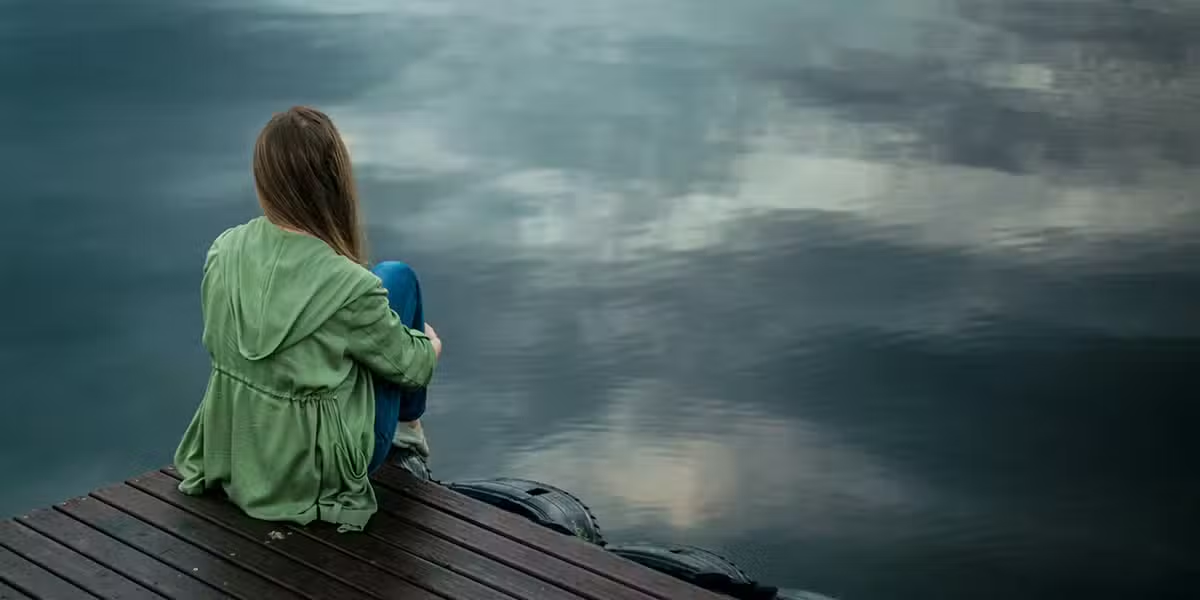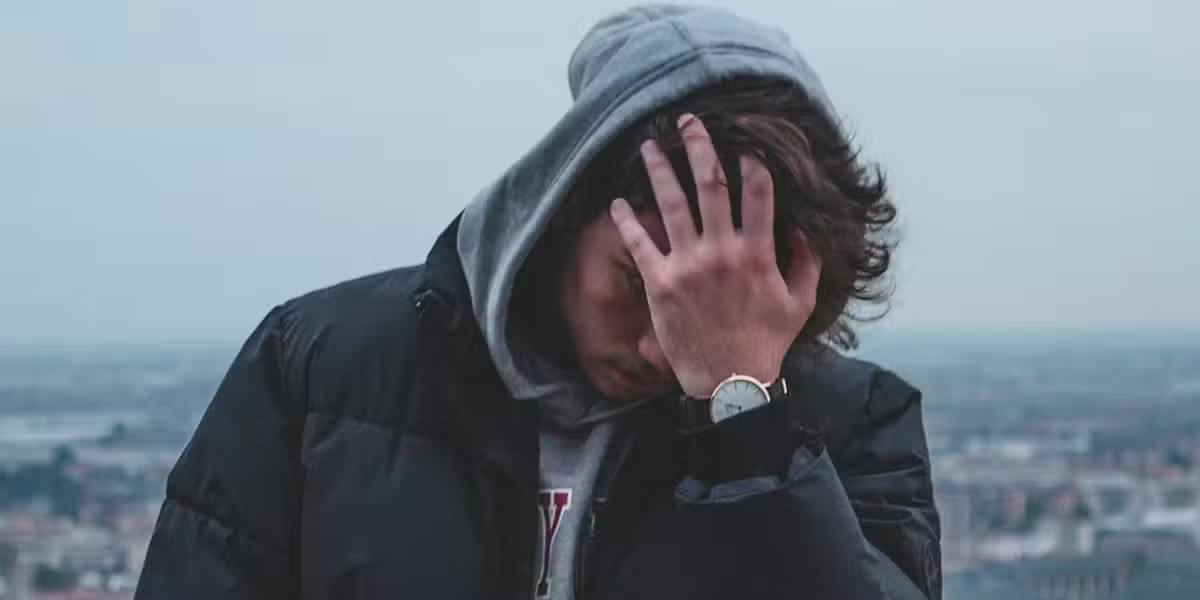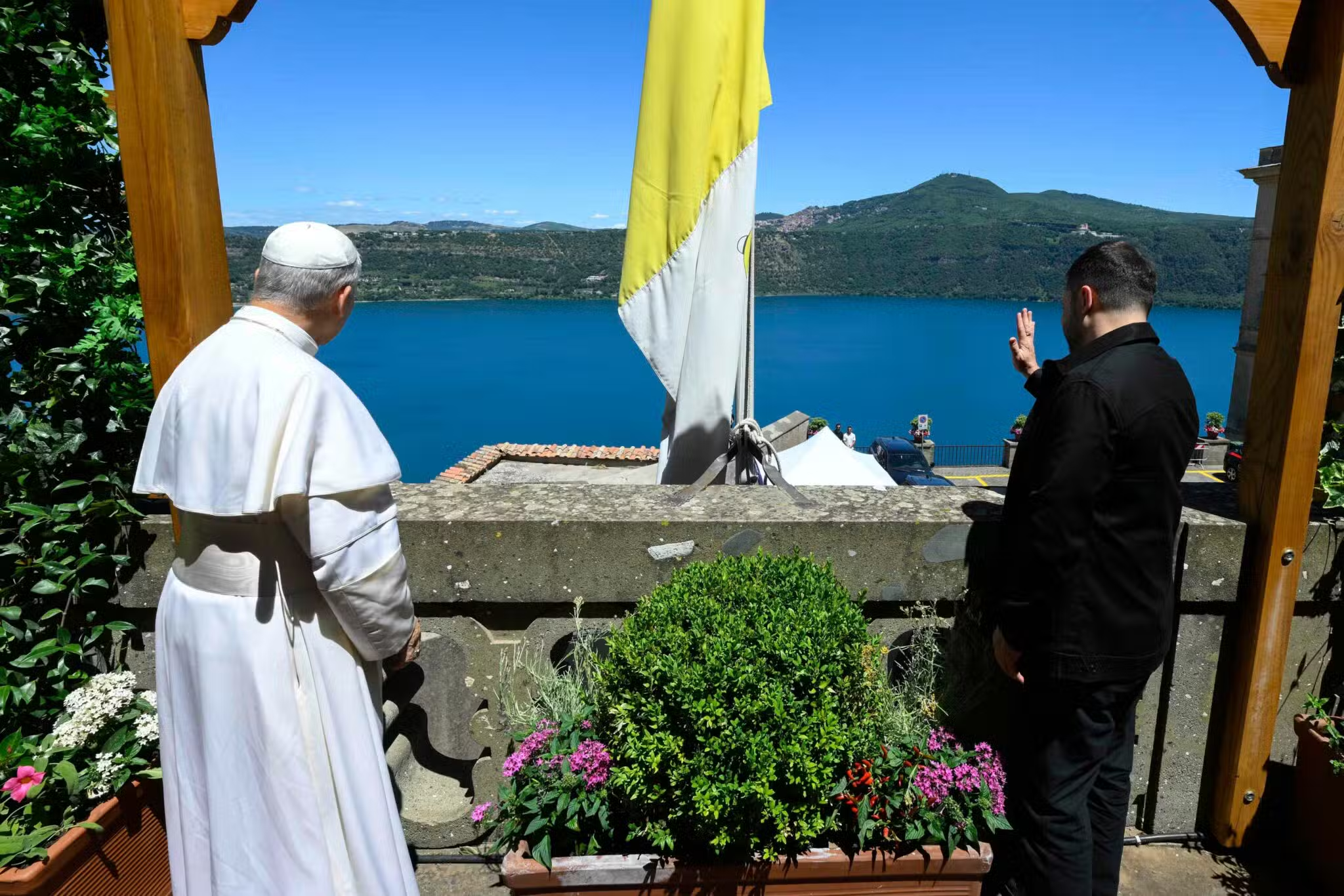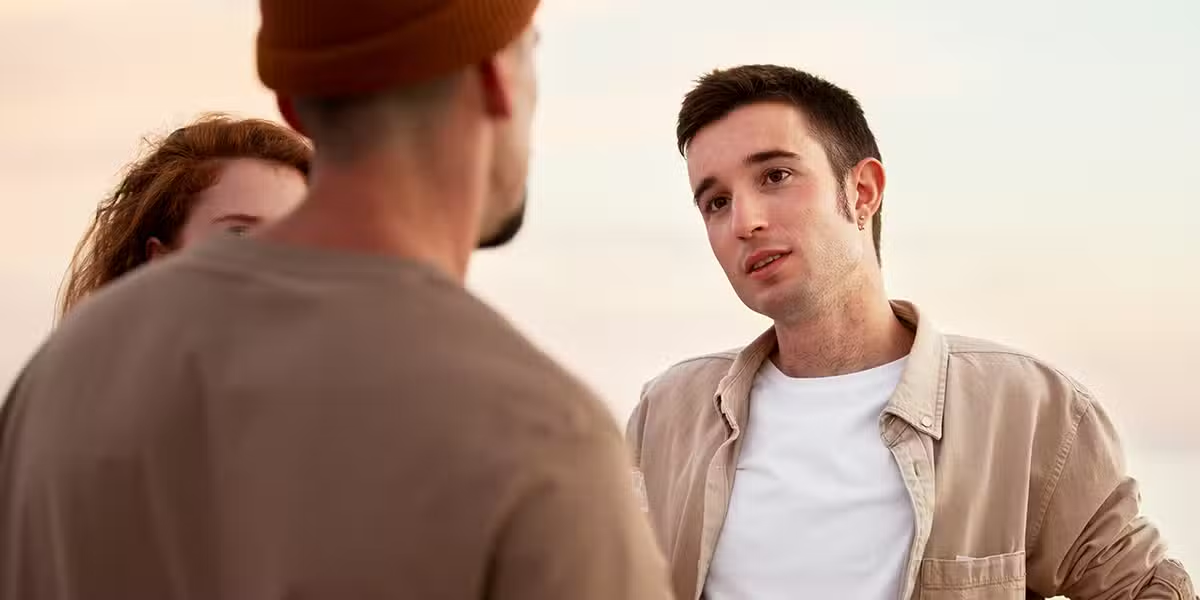The example of St. Francis can be our guide as we navigate bitter divisions in our world, our nation—and perhaps even our dinner tables.
I remember when I realized a new age of discourse was upon us.
It was mid-November 2016. A contentious election had resulted in the unexpected. And now, as the holidays approached, there was much talk in the progressive circles in which I ran about how to navigate the clashing of political opinions at the Thanksgiving table. Many concluded that the most healthy response might be to simply not attend their family’s annual dinner to protect their own mental and emotional health. Of course, I didn’t know each person’s unique situation, but I was nonetheless stunned each time I heard about politics interfering with close relationships.
I grew up west of Indianapolis with a cornfield in our backyard. I was surrounded by a loving extended family who were all from rural, conservative communities. I’d return home for the holidays and see our neighbor proudly flying his red and white “Make America Great Again” flag and smell the stench of nearby cattle, which I found strangely refreshing amid my city life in Charlotte, North Carolina. That same neighbor always brought us fruit and vegetables from his garden, and, in the years following the sudden passing of my mother, would check up constantly on my dad. But now I was supposed to look at him as morally inferior because of his political leanings?
Ideas in my family were always treated as a playground, something for goofing around about at recess before getting back to class, which is to say learning to love more fully. Sometimes there’d be an occasional scuffle on the playground, but it was all in good fun, and then it was back to the classroom. What mattered was our hearts, not our minds; our commitment to each other, not our ideas; our experiences together, not our differing opinions. Ideas could not hurt us—they were for play, debate, sharpening each other.
Now, however, it seemed the nation had entered an era in which political ideas were conflated with a person’s character and identity, leading to the rampant judgment of others who believed differently. Uncle Joe wasn’t just a hardworking, blue-collar lover and protector of his family who sometimes said some quirky or conspiratorial things around the dinner table; no, now Uncle Joe was ignorant or “complicit.” I noticed how progressives would correlate Trump voters with White supremacy or misogyny just as I had seen the religious Right characterize pro-choice liberals as murderous baby-killers in the ’90s and early 2000s. If I’m honest with myself, there was an appeal to this kind of moral conviction. I knew too well from my conservative evangelical background that the rush of moral certainty is addictive.
Listening to live music one crisp November evening at a hole-in-the-wall blues venue in Charlotte, I remember contemplating the absurdity of this divisive rhetoric. I watched the mosaic of music lovers—Black, White, old, young, blue-collar, white-collar, people who likely could not have voted more differently the week before—lose themselves on the dance floor and become one again in the song, in the dance, in their mutual surrender to the beauty rising within the present moment.
This was America, not cable news, not social media. How were we to get back to who we once were?
Francis of Assisi: The Original Book Banner
Our unprecedented access to information in the 21st century should have made us all more humble. Instead, it has made us more certain. This simple fact is at the crux of our society’s illness.
There is an obscure story in the Franciscan tradition—reported by three of St. Francis’ earliest companions (Leo, Rufino, and Angelo)—about the saint’s hesitancy to allow his early brothers to own books. Their title of that story is apt: “The Dangers of Learning.”
The story goes that one of the brothers who had just joined their ragtag bunch had the ability to read a Psalter and requested one. Twice he asked Francis, then a third time when he approached Francis one cold evening by the fire. This time, Francis had enough. “When you get a Psalter, you will start to yearn for a breviary. When you get a breviary, you will enthrone yourself on a chair like a grand prelate and say to your brother, ‘Bring me my breviary.’” Next we’re told that Francis “took a handful of ashes and poured them on his head” while shouting like a madman, “I want a breviary! I want a breviary!”
What’s going on with this absurd story? Francis had a flair for theatrics, resulting in actions that today might lead to some kind of psychological diagnosis. But from the depth of his relationship with God and the perspective this gave him, he also intuited a profound understanding of the human ego (though he wouldn’t have used those terms). These words from St. Paul likely resonated with Francis: “Knowledge inflates with pride, but love builds up” (1 Cor 8:1).

Not unlike our age, Francis saw firsthand how “knowledge” led to division rather than connection and humility: in the spiritual and scriptural justification for the Crusades, in the widening disconnect between clergy and laity, and in academia in which the study of theology remained in the head and never became “incarnational” in a person’s life. In the Franciscan tradition, charity—which is rooted in love—arose from one’s connection to the “other.” Some scholars conclude Francis’ Christian conversion fundamentally unfolded as his relationship with lepers continued to deepen and grow. Lepers who were once “bitter” to Francis not only became “sweet,” but also held the key to his own continued conversion as a follower of Christ.
Conspiracies on the Right and virtue-signaling on the Left are examples of how learning has “puffed up” and created division rather than openness to the other. Unfortunately, both journalism and academia—two of the most important institutions in a liberal democracy—have formed echo chambers instead of cultivating an openness to differing opinions, a dialectic that, in a complex society like ours, is ultimately the only route to a fuller understanding of the truth.
Francis and the Sultan
Philosopher Peter Rollins once shared a parable about a mystic, an evangelical, and a fundamentalist dying and going to heaven. St. Peter greets them, then guides them into a waiting room where they will each be called to meet with Jesus himself. First, Jesus calls in the mystic. Five minutes later, the mystic leaves his meeting with Jesus, smiling and shaking his head, “I knew I got it all wrong.” Next, Jesus waves in the evangelical. Thirty minutes later, the evangelical leaves his meeting with Jesus, red-faced and sheepish, “I can’t believe I got it all wrong.” Next, Jesus calls the fundamentalist. Three hours later, Jesus himself leaves the meeting, disoriented and scratching his head, “How could I have been so wrong?”
Rollins shares that when he first told that parable early in his career as a public intellectual, the point was to get listeners to identify more with the mystic. Now, however, he believes the parable ought to remind us how we are all, on some level, fundamentalists—ridiculously explaining all our answers about life to the author of life itself.
Francis’ daring journey to meet with Sultan Malik al-Kamil during the Fifth Crusade is often discussed as a model for interfaith dialogue, diversity, and peace. But few emphasize the element that animated Francis’ journey at the start: indeed, his fundamentalism. His entire goal for the journey was to convert the sultan. If he could convert the sultan to Christianity, then perhaps other Muslims would become Christ-followers as well. Then, maybe the war would be over, as both sides united around one, true religion. Francis would be a hero. It is possible that Francis was not even seeking peace on his expedition, but rather glory. He had grown up wishing to be a knight; now, he was likely going to become a martyr.
But, to Francis’ credit, his openness to experiencing the beauty of the human heart again ruptured his certainty. We’re told that Francis and the sultan spent many days together, likely debated with one another, learned from each other, formed a strong bond, and perhaps even prayed together. Remember, this was the leader of the Muslims, the man whom the pope had waged war against, the man who vindicated the killing of Christians. Not only that, but Francis returned to Assisi boldly affirming the beautiful aspects of the Islamic faith and Muslim way of life. Likely referencing Islam’s 99 Names of God, Francis shockingly wrote for his followers, “Wherever I find our Lord’s most holy names and written words in unbecoming places, I want to gather them up, and I beg that they be gathered up and placed in a becoming place.”
Watermarks and Remnants
In his newfound friendship with the sultan, Francis found that war is not the peak of conflict but the absence of conflict. War was the inability to have meaningful dialogical disagreement and thus the need to kill and eliminate the other. Francis still likely disagreed with the sultan’s theological conclusions (or he would have become a Muslim), but he was simultaneously moved by the sultan’s devotion, faith, and, most of all, his heart. Francis realized that the sultan made him a better person and, yes, even a better Christian. As Rollins notes, “We call wars ‘conflicts,’ yet war manifests the inability of at least one party to face conflict, i.e., it shows the desire to annihilate the other rather than tarry with difference.”
Today in America we are not yet seeking elimination of the other (or are we?), but the inability to have meaningful dialogical disagreement without labeling or demonizing indicates a slow spiraling into a type of war. Have we allowed our access to knowledge to “puff us up” rather than humble us? Has our fundamentalism, no matter what “side” we’re on, convinced us we’re the heroes in the story when in fact it’s heart-to-heart connection with the person who is different from us that has evolved our country—that indeed holds the key to our own conversion? Are we open to our certainty, in some way, being ruptured by the lived experience of another, as was the case with Francis and the sultan?
Each heart, mind, and story is its own universe to explore. St. Bonaventure’s word for this myriad diversity within creation was “remnants,” watermarks from the ever-creating, ever-loving, self-diffusive “fountain fullness” (fontalis plenitudo) of the Trinity that continually “incarnates” itself in our reality, particularly in unexpected, unassuming places. Yes, that includes the beautiful uniqueness of a person’s heart and mind. In the Franciscan tradition it was the leper—the person who had been most overlooked and even cast out by society—in which Francis found the fountain bursting into his reality.
Franciscan peace is a posture of openness and worship toward the diversity of the imago dei, borne in the hearts (and minds) of all people. This refusal to label, demonize, or cheapen someone’s divine identity to his or her political leanings also paradoxically makes room for conflict and debate, for without these ingredients what you have is war. As Thomas Merton wrote in his famous mystical encounter at the corner of 4th and Walnut in downtown Louisville, Kentucky, where he felt mysteriously connected to the passersby around him: “If only they could all see themselves as they really are. If only we could see each other that way all the time. There would be no more war, no more hatred, no more cruelty, no more greed. I suppose the big problem would be that we would fall down and worship each other.”
Come November, people will have to make their own decisions at the ballot box. But, like Francis, might we allow our fundamentalism—and our addiction to certainty—to be ruptured along the way? Might we pursue charity over knowledge? Could the gift of our own listening ears be fundamental to our ever-evolving dance?









9 thoughts on “Building Peace in a Nation Divided ”
Your words are amazing and beautiful! I have only one comment. I totally agree with everything written here. But…..when it comes to killing babies in the womb….is where my mind cannot accept such a horrific act. I understand everything else and our differences of opinion on all the other matters and issues before us…..except that ONE. I pray for all those involved in abortion in any way whatsoever. I pray their hearts will be changed one day. I don’t “hate” these abortion lovers….but it’s so human to only think the worst of them…all the while begging God to change my heart toward them. Human nature is so real…..and loving an abortionist is so hard. But I will continue to pray for them.
Not everyone believes human life begins at conception. Great theologians have differed on the question Qickening was once the standard. Most folks think the first trimester end. Don’t think we have the right to make the call for others at least not very early on. My stumbling block is supporting a person for president who took born children from their parents. No respect for life there
Christine: You raise a good point. The rationale for this was that illegal boarder crossing was considered a felony. Thereby, those parents and children were separated. But, not permanently. I’m sure in hindsight, that would not happen again if Trump should win in November. Now, with the open border policies of the Biden administration, there are 85,000 children unaccounted for. Most likely sold into sex trafficking or slave labor. Does that concern you as well?
Does “meaningful dialogical disagreement “ mean that we should entertain the views of those who are ideologically committed to the notions of abortion, gender reassignment, etc? Debating who is the greatest NFL quarterback or how best to control inflation are legitimate issues that can benefit from knowledgeable debate and discussion; other issues, like the ones previously mentioned here, are evil and do not lend themselves to a “pros and con” discussion, only abandonment.
I’m getting tired of abortion being the only talking point for Christians. There are many issues facing our nation and people who are pro-life or uptight about gender issues that do not affect them are always the most vocal. What about poverty? Climate change? Political violence? It’s not all about abortion.
i am very tired of abortion being the forefront of the Pro-Life movement, not once is mentioned anything about Mass Shootings in schools of innocent children, teachers, etc. The Pro-life movement never mention anything about gun control, murders, capital punishment, political violence (my brother threatened that I would be the first “dumbocrat” he would kill when it comes to a civil war Trump’s movement and Trump’s causes). I have never heard any Pro-Life people talk about Climate Change, poverty etc. And what about the babies born into families who are extremely needy of help and complain about taxes going to help the poor who need the basics. Methinks so called “Pro-Life” people only focus on one issue, abortion! Once a person is born, to hell with them.
Timely and relevant. Hits all the right notes. Good stories. Well done Stephen!
Thank you for your article, Stephen. During previous administration the prejudices against my racec in my town and Catholic church became evident. They became freer with their criticism and their true feelings were clear, even in front of me. So much so that we don’t hang out and just politely greet each other before mass or at the store. Unfortunately, during trumps 4 yrs, being prejudice became the norm and acceptable behavior, that is my sincere observation and opinion.
I had to respond to Rich Cola’s response in the October 2024 issue (Feedback from our online readers) to Christine Heflin’s letter as it is offensively full of false statements in an obvious attempt to use the St. Anthony Messenger to make political points.
First, Trump is the one who put the children at risk of sex trafficking or slave labor.
The children and parents were separated with intentional cruelty; no records were kept as to where the children were sent or how the parents might reunite them. Trump took no interest in their welfare, or reuniting the families. It took many pro bono lawyers, concerned donors, and other years to research and find some of the families, creating much heartbreak and leaving the children in danger and in many cases, to unknown circumstances. The fight continues to this day, as many remain separated, unable to learn about their children and parents. The following article contains more information
[The Washington Post] Six years later, 1,400 children remain separated from their families
The public called for children separated from their families to rejoin them. But the [Trump] administration didn’t keep records allowing that to easily happen. Joe Biden made reunification a part of his 2020 campaign for president and, upon taking office, instantiated a task force that aimed to figure out how to get kids back to their families.
https://wapo.st/4dlnrwq
Also, seeking asylum is not a felony; it is protected under law. See, usa.gov , seeking asylum. Making the false statement that all were “illegal” is wrong.
Where is the pro-life attitude towards these children? Where is the pro-family attitude towards our fellow human beings?
Trump has shown his hatred of immigrants from the first day of his campaign, most recently vowing to deport all immigrants, even those who have become citizens, so for Mr. Cola to say it would never happen again is absurd. It would be even worse, cruelly and unjustly separating families, and depriving families of the parents/breadwinners.
Sadly, I am asking to remain anonymous because of the viral hatred and threats shown towards those of us who speak truth to Trump.